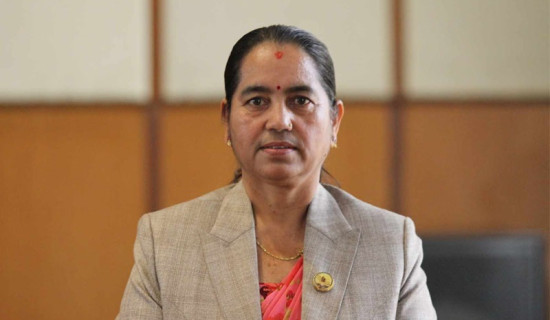- Wednesday, 18 February 2026
Navigating Nepal's Transition From LDC Status
Nepal’s impending graduation from the Least Developed Country (LDC) category is both a significant milestone and a complex challenge. This transition, slated for 2026, signifies the country's progress in human assets and economic vulnerability but comes with the caveat of losing preferential international support.
Nepal has made significant strides in improving its Human Asset Index (HAI) and reducing its Economic Vulnerability Index (EVI), two of the three criteria required for LDC graduation. These improvements are reflected in enhanced literacy rates, better healthcare outcomes, and increased economic resilience. As Nepal stands on the brink of this transformation, it must strategically navigate the associated impacts to ensure that graduation leads to sustained and irreversible progress.
Immediate impacts
One of the most immediate impacts of Nepal's graduation from LDC status will be in international trade. Nepal currently benefits from preferential schemes such as the European Union’s Everything But Arms (EBA) initiative, which allows duty-free access to EU markets. Post-graduation, Nepal will lose these privileges, making its exports less competitive due to higher tariffs. Similarly, preferences extended by countries like Canada and Turkey will also be withdrawn. The trade relationship with India, governed by the Indo-Nepal Treaty of Trade, will remain unaffected. However, losing the World Trade Organisation’s Special and Differential Treatment (SDT) and the Trade-Related Aspects of Intellectual Property Rights (TRIPS) waiver could pose additional challenges for Nepal’s budding pharmaceutical and IT sectors.
Contrary to some fears, the flow of foreign aid might not witness a drastic decline. Multilateral organisations, such as the World Bank, the International Monetary Fund, and the Asian Development Bank, base their support on income criteria rather than LDC status. Bilateral donors often consider broader humanitarian, economic, and political factors, which means that overall development assistance might not dwindle significantly. However, a shift in the nature of aid is anticipated. Some grants might be replaced with concessional loans, potentially increasing Nepal’s debt burden. Beyond trade and aid, Nepal will forfeit several other LDC-specific support measures, including travel aid, sponsorships, and access to certain educational and research facilities.
There will be a reduction in the number of scholarships and research fellowships, and Nepal’s monetary contribution to international organisations like the United Nations will increase. Apart from economic impacts, Nepal’s graduation from LDC status will also influence its diplomatic standing and strategic partnerships. As an LDC, Nepal often received preferential treatment in international forums and negotiations. Post-graduation, Nepal will need to assert its position based on different criteria, potentially shifting its diplomatic strategies towards economic alliances and regional cooperation.
Moreover, the social implications of graduation should not be overlooked. Enhanced economic growth and improved social indicators have historically correlated with reduced poverty and improved standards of living. Nepal’s challenge will be to sustain these gains and ensure they benefit all segments of society, including marginalised groups and rural populations that may not immediately benefit from economic growth.
The five-year preparatory period before graduation that becomes effective in 2026 must be fully utilised to develop a "smooth transition strategy." This strategy should map out the potential loss of benefits, identify effective responses, and adjust institutional and legal frameworks to comply with international obligations. Building Nepal’s productive capacity is crucial. The focus should be on high-value products and services that can compete in the global market even without preferential treatment. Diversifying trade destinations and product lines will reduce dependency on any single market and mitigate the risks associated with losing preferential access.
Nepal must actively engage with its largest trading partners to negotiate favorable terms. Maintaining the tariff waivers under the Indo-Nepal Trade and Tariff treaties is vital. Additionally, securing a comprehensive Duty-Free Quota-Free (DFQF) scheme with China through appropriate bilateral agreements will provide a cushion against the loss of LDC-specific benefits. Negotiations with the EU for flexible transition measures and concessional schemes like GSP+ should also be pursued. Expanding the funding portfolio through blended finance will be critical. Encouraging Foreign Direct Investment (FDI) and ensuring the productive use of remittances can offset the reduction in foreign aid. Nepal should also aim to gradually decrease its reliance on foreign aid, focusing instead on self-sustained economic growth.
Productive capacity
The private sector must be prepared to adapt to the post-graduation scenario by adopting efficient production methods to offset the costs incurred by losing tariff benefits. Public-private partnerships can play a pivotal role in this transition, fostering innovation and competitiveness.
A dedicated "Coordination Committee" comprising the National Planning Commission, Foreign Ministry, Ministry of Commerce, and other relevant bodies should be established to steer the graduation process. Engaging development partners in capacity-building and technology enhancement initiatives will further bolster Nepal’s readiness for graduation.
Nepal's graduation from the LDC category is a historic achievement that showcases its progress in key development areas. To ensure this progress lasts, Nepal should focus on building its productive capacity, diversifying trade and funding sources, improving governance, and working with international partners. By embracing these challenges with a strategic vision, Nepal can not only sustain its developmental gains but also emerge as a resilient and thriving economy in the global arena.
(The author is a B.A. LL.B student at the Kathmandu School of Law)
















